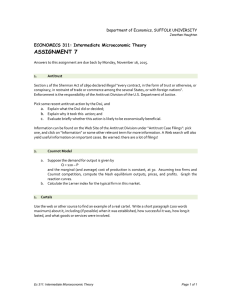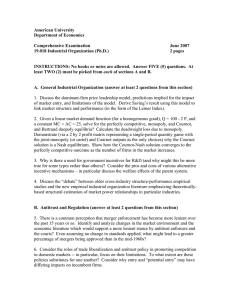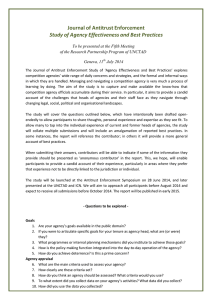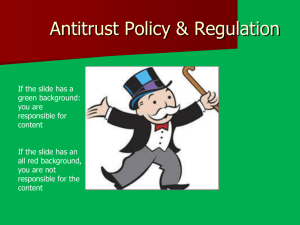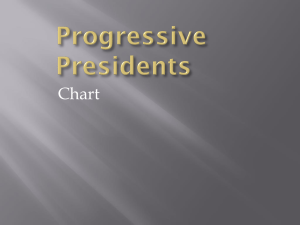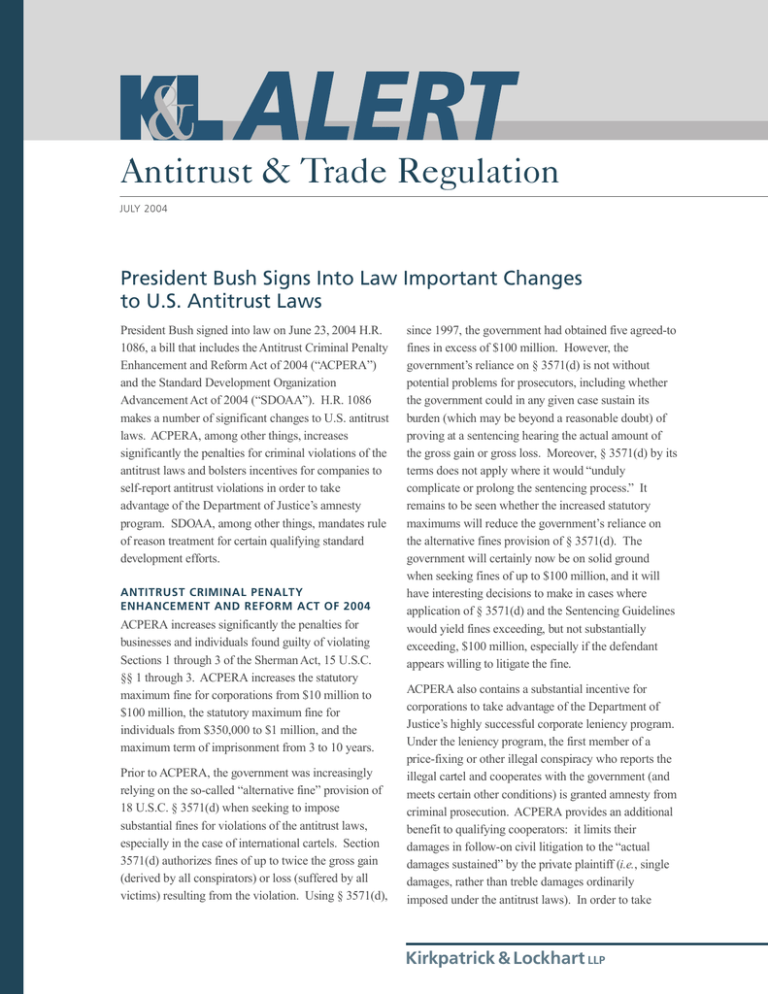
Antitrust & Trade Regulation
JULY 2004
President Bush Signs Into Law Important Changes
to U.S. Antitrust Laws
President Bush signed into law on June 23, 2004 H.R.
1086, a bill that includes the Antitrust Criminal Penalty
Enhancement and Reform Act of 2004 (“ACPERA”)
and the Standard Development Organization
Advancement Act of 2004 (“SDOAA”). H.R. 1086
makes a number of significant changes to U.S. antitrust
laws. ACPERA, among other things, increases
significantly the penalties for criminal violations of the
antitrust laws and bolsters incentives for companies to
self-report antitrust violations in order to take
advantage of the Department of Justice’s amnesty
program. SDOAA, among other things, mandates rule
of reason treatment for certain qualifying standard
development efforts.
ANTITRUST CRIMINAL PENALTY
ENHANCEMENT AND REFORM ACT OF 2004
ACPERA increases significantly the penalties for
businesses and individuals found guilty of violating
Sections 1 through 3 of the Sherman Act, 15 U.S.C.
§§ 1 through 3. ACPERA increases the statutory
maximum fine for corporations from $10 million to
$100 million, the statutory maximum fine for
individuals from $350,000 to $1 million, and the
maximum term of imprisonment from 3 to 10 years.
Prior to ACPERA, the government was increasingly
relying on the so-called “alternative fine” provision of
18 U.S.C. § 3571(d) when seeking to impose
substantial fines for violations of the antitrust laws,
especially in the case of international cartels. Section
3571(d) authorizes fines of up to twice the gross gain
(derived by all conspirators) or loss (suffered by all
victims) resulting from the violation. Using § 3571(d),
since 1997, the government had obtained five agreed-to
fines in excess of $100 million. However, the
government’s reliance on § 3571(d) is not without
potential problems for prosecutors, including whether
the government could in any given case sustain its
burden (which may be beyond a reasonable doubt) of
proving at a sentencing hearing the actual amount of
the gross gain or gross loss. Moreover, § 3571(d) by its
terms does not apply where it would “unduly
complicate or prolong the sentencing process.” It
remains to be seen whether the increased statutory
maximums will reduce the government’s reliance on
the alternative fines provision of § 3571(d). The
government will certainly now be on solid ground
when seeking fines of up to $100 million, and it will
have interesting decisions to make in cases where
application of § 3571(d) and the Sentencing Guidelines
would yield fines exceeding, but not substantially
exceeding, $100 million, especially if the defendant
appears willing to litigate the fine.
ACPERA also contains a substantial incentive for
corporations to take advantage of the Department of
Justice’s highly successful corporate leniency program.
Under the leniency program, the first member of a
price-fixing or other illegal conspiracy who reports the
illegal cartel and cooperates with the government (and
meets certain other conditions) is granted amnesty from
criminal prosecution. ACPERA provides an additional
benefit to qualifying cooperators: it limits their
damages in follow-on civil litigation to the “actual
damages sustained” by the private plaintiff (i.e., single
damages, rather than treble damages ordinarily
imposed under the antitrust laws). In order to take
Kirkpatrick & Lockhart LLP
advantage of this “de-trebling” provision, however, the
cooperator, in addition to cooperating with the
government, must assist the private claimant(s)
(including a class of claimants) by, among other things,
providing accounts of facts, producing documents and
providing testimony. This de-trebling provision is
subject to a five-year sunset provision.
Finally, ACPERA also amends that Antitrust
Procedures Act of 1974 (know as the Tunney Act). The
Tunney Act requires judicial review of antitrust consent
decrees to determine whether they are in the public
interest. The amendments are designed to increase the
level of judicial scrutiny of consent decrees, requiring
(rather than permitting) evaluating courts to consider a
variety of factors, including competitive impacts,
provisions for enforcement and modification, duration
of relief, alternative remedies, and impact upon
competition in the relevant market(s) and upon the
public in general.
THE STANDARD DEVELOPMENT
ORGANIZATION ADVANCEMENT ACT OF 2004
SDOAA, also part of H.R. 1086, seeks to reduce the
antitrust exposure of qualifying standards development
organizations (“SDOs”) through amendments to the
National Cooperative Research and Production Act of
1993. Among other things, SDOAA legislatively
mandates a rule of reason analysis for all activities of
qualifying SDOs, except for price fixing and market
allocation, which remain subject to per se
condemnation.1 To be eligible for SDOAA’s
protections, SDOs must file disclosures of their
activities with the government. The Department of
Justice and the Federal Trade Commission announced
1
on June 25, 2004 the implementing procedures for
registering an SDO with the agencies. The
implementing procedures require, among other things,
that notifications be filed no later than 90 days after the
date of the enactment of SDOAA or the
commencement of standard development activities and
include documents showing the nature and scope of the
SDO’s activities.
SDOAA also de-trebles damages and eliminates joint
and several liability for qualifying SDOs. The Act does
not, however, modify the liability under the antitrust
laws of any person not a full-time employee of a
qualifying SDO who violates the antitrust laws by
participating in standard development activity deemed
illegal.
Although these amendments are not particularly
controversial, they are complex and can be difficult to
navigate. Moreover, failing to timely and effectively
invoke the benefits of the changes can have serious
consequences, including continued exposure to treble
damages under circumstances where the law may now
limit potential exposure to actual damages. Potentially
affected corporations and individuals should seek
knowledgeable counsel to ensure that they can
effectively take advantage of these important changes
in the law.
The Act further excepts from mandatory rule of reason treatment
exchanges of competitive information not reasonably required
for standard setting.
JOSEPH C. SAFAR
jsafar@kl.com
412.355.6443
K&L’s Antitrust and Trade Regulation practice provides
comprehensive antitrust counseling to clients on achieving business
objectives while complying with the antitrust laws. If you have any
questions regarding the subject matter discussed in this Alert, please
contact one of the following attorneys:
James E. Scheuermann 412.355.6215
Thomas A. Donovan
412.355.6466
Christopher O.B. Wright 415.249.1083
jscheuermann@kl.com
tdonovan@kl.com
cobwright@kl.com
®
Kirkpatrick & Lockhart LLP
Challenge us. ®
BOSTON
■
DALLAS
■
HARRISBURG
■
LOS ANGELES
■
MIAMI
■
NEWARK
■
NEW YORK
■
PITTSBURGH
■
SAN FRANCISCO
■
WASHINGTON
.........................................................................................................................................................
This publication/newsletter is for informational purposes and does not contain or convey legal advice. The information herein
should not be used or relied upon in regard to any particular facts or circumstances without first consulting with a lawyer.
2
LLP. ALL RIGHTS RESERVED.
© 2004 KIRKPATRICK & LOCKHART
KIRKPATRICK & LOCKHART LLP ANTITRUST & TRADE REGULATION ALERT

